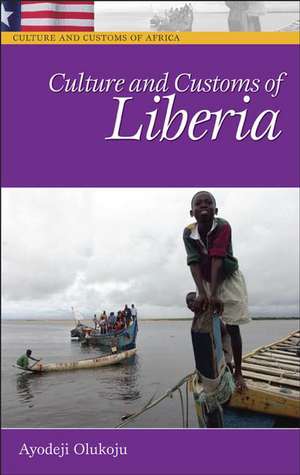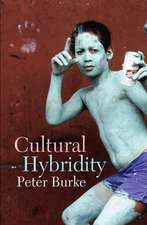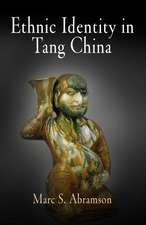Culture and Customs of Liberia: Culture and Customs of Africa
Autor Ayodeji Olukojuen Limba Engleză Hardback – 29 mar 2006 – vârsta până la 17 ani
Din seria Culture and Customs of Africa
- 42%
 Preț: 270.46 lei
Preț: 270.46 lei - 42%
 Preț: 237.51 lei
Preț: 237.51 lei - 42%
 Preț: 235.43 lei
Preț: 235.43 lei - 42%
 Preț: 235.52 lei
Preț: 235.52 lei - 43%
 Preț: 268.37 lei
Preț: 268.37 lei - 42%
 Preț: 251.63 lei
Preț: 251.63 lei - 42%
 Preț: 269.79 lei
Preț: 269.79 lei - 42%
 Preț: 228.75 lei
Preț: 228.75 lei - 43%
 Preț: 244.08 lei
Preț: 244.08 lei - 42%
 Preț: 236.55 lei
Preț: 236.55 lei - 42%
 Preț: 235.71 lei
Preț: 235.71 lei - 45%
 Preț: 90.94 lei
Preț: 90.94 lei - 42%
 Preț: 251.44 lei
Preț: 251.44 lei - 52%
 Preț: 250.10 lei
Preț: 250.10 lei - 42%
 Preț: 300.68 lei
Preț: 300.68 lei - 42%
 Preț: 234.56 lei
Preț: 234.56 lei - 50%
 Preț: 227.06 lei
Preț: 227.06 lei - 42%
 Preț: 225.14 lei
Preț: 225.14 lei - 50%
 Preț: 227.43 lei
Preț: 227.43 lei - 44%
 Preț: 168.07 lei
Preț: 168.07 lei - 42%
 Preț: 226.96 lei
Preț: 226.96 lei - 42%
 Preț: 236.84 lei
Preț: 236.84 lei - 42%
 Preț: 236.38 lei
Preț: 236.38 lei - 42%
 Preț: 238.27 lei
Preț: 238.27 lei - 50%
 Preț: 226.96 lei
Preț: 226.96 lei
Preț: 225.45 lei
Preț vechi: 391.04 lei
-42% Nou
Puncte Express: 338
Preț estimativ în valută:
43.15€ • 46.89$ • 36.27£
43.15€ • 46.89$ • 36.27£
Carte tipărită la comandă
Livrare economică 21 aprilie-05 mai
Preluare comenzi: 021 569.72.76
Specificații
ISBN-13: 9780313332913
ISBN-10: 0313332916
Pagini: 184
Dimensiuni: 156 x 235 x 19 mm
Greutate: 0.4 kg
Editura: Bloomsbury Publishing
Colecția Greenwood
Seria Culture and Customs of Africa
Locul publicării:New York, United States
ISBN-10: 0313332916
Pagini: 184
Dimensiuni: 156 x 235 x 19 mm
Greutate: 0.4 kg
Editura: Bloomsbury Publishing
Colecția Greenwood
Seria Culture and Customs of Africa
Locul publicării:New York, United States
Notă biografică
AYODEJI OLUKOJU is Professor of History at the University of Lagos, Nigeria. He is author of The Liverpool of West Africa: The Dynamics and Impact of Maritime Trade in Lagos, 1900-1950.
Cuprins
Series ForewordPrefaceChronologyIntroductionReligion and WorldviewLiterature and MediaArt and Architecture/HousingCuisine and Traditional DressGender Roles, Marriage, and FamilySocial Life and CustomsMusic and DanceIndex
Recenzii
The author presents an overview of life in Liberia from pre-colonial days to the present, encompassing all of the various diverse groups in the country. The task is a difficult one, but Professor Olukoju, who teaches history at the University of Lagos, Nigeria, has made a noble attempt. He has reviewed much of the basic literature, drawing upon the research that exists for the country and in particular using the many articles which have appeared in the Liberian Studies Journal since its inception in 1968. He is to be congratulated for the overview he has given.
Americo-Liberians and the descendants of liberated slaves make up a minority within this complex culture, but they played a disproportionately large role in defining Liberian fashion, cuisine, religious practice, marriage customs, and attitudes toward literacy. Indigenous culture is also important to Liberia, and the result is rich and complex. In addition, political upheaval has caused a significant amount of migration, so diverse subcultures have intermingled in the relative safety of the nation's cities and refugee camps both inside and outside Liberian borders. Olukojo provides an accessible resource for the general reader, concentrating on the region's religions, literature, media, art, architecture, cuisine, traditional dress, gender roles, marriage, family, social customs, lifestyle, music and dance, tracing the influence of both the American and the traditional. The illustrations are well-chosen and include period photographs and pictures of current daily life.
Americo-Liberians and the descendants of liberated slaves make up a minority within this complex culture, but they played a disproportionately large role in defining Liberian fashion, cuisine, religious practice, marriage customs, and attitudes toward literacy. Indigenous culture is also important to Liberia, and the result is rich and complex. In addition, political upheaval has caused a significant amount of migration, so diverse subcultures have intermingled in the relative safety of the nation's cities and refugee camps both inside and outside Liberian borders. Olukojo provides an accessible resource for the general reader, concentrating on the region's religions, literature, media, art, architecture, cuisine, traditional dress, gender roles, marriage, family, social customs, lifestyle, music and dance, tracing the influence of both the American and the traditional. The illustrations are well-chosen and include period photographs and pictures of current daily life.













